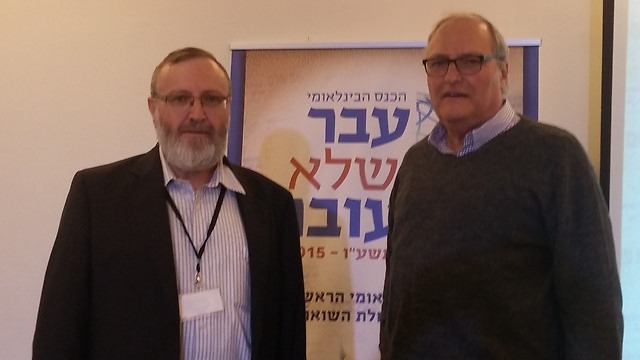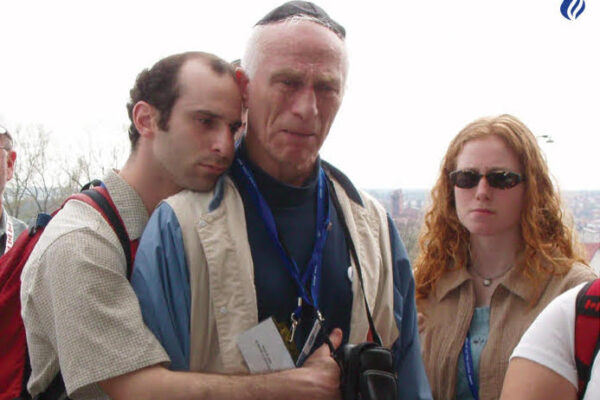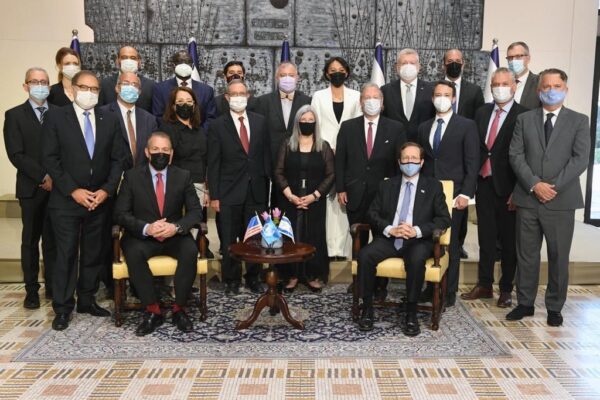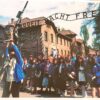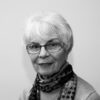After Lithuania changed the definition of ‘genocide’ and Baltic countries have turned murderers of Jews into national heroes, Holocaust researchers are accusing the State of Israel of standing idly by as history is being re-written.
The testimonies are fading away, the memorial sites are turning into entertainment centers, and the historical story is seen as just another “Jewish narrative”: If anyone thought that Holocaust denial was a marginal phenomenon among a few anti-Semites and Israel haters, evidence shows that is it a much wider, more well-established and dangerous phenomenon that is receiving reinforcement on the ground from eastern European countries.
In Lithuania, for example, people are doing everything to downplay the significance of the horrors of the war as a unique event in the history of mankind, and in Ukraine a famous mass murder site has turned into a thriving jogging spot.
According to Dr. Efraim Zuroff, a Nazi hunter and director of the Simon Wiesenthal Center office in Jerusalem, many countries have adopted an intentional policy leading to de facto Holocaust denial. While researchers and historians are trying to fight the new phenomenon and to get western Europe to join the battle, the State of Israel is actually standing back and doing nothing.
Speaking at the Shem Olam Institute‘s international conference “A Past that Doesn’t Pass,” which opened in Europe Monday, Dr. Zuroff pointed at Lithuania as the country leading the change. He noted that it initiated a change in the definition of “genocide,” thereby essentially “uniting” the memory of the Holocaust with the memory of communism.
In Ukraine, the parliament approved a law banning denial of the communist holocaust and imposing a two-year prison sentence on those violating it.
According to the Nazi hunter, this is part of an ongoing attempt to convince the world that there were two holocausts, and that therefore the European Jews’ Holocaust was not a unique radical event. “August 23 is marked as a memorial day for the victims of the totalitarian regimes,” he noted. “The memory of the Holocaust is being pushed away as part of this process.”
Rabbi Avraham Krieger, head of the Shem Olam Institute for Holocaust education and research, believes the new Holocaust deniers are driven by a psychological motive, namely an attempt to dissolve the perception of the Holocaust as a unique phenomenon in favor of a historical description which will minimize the feelings of guilt among the countries which actively participated – or whose citizens actively participated – in the murder of Jews.
Dr. Zuroff sees it too. He says there is an attempt to conceal and blur the eastern Europeans’ role in the massacre. “In Lithuania there was a systematic killing of Jews by the local population,” he explained. “That is the reason why 96 percent of the Jews there did not survive and many communities were completely erased. The intentional goal is to conceal this fact.
“The mass murderers of Jews among the local population are perceived as national heroes because of their war against the communists, and streets, squares and governmental institutions have been named after them. How can anyone acknowledge their role in the annihilation if the murderers are considered heroes?”
Lithuania is not alone. According to the two researchers, “soft denial” is taking place in Baltic countries like Estonia and Latvia, as well as in Poland, Croatia and Hungary.
Bodies of thousands of Jews under a green park
“For example Joanna Bator, a local historian, describes construction works for the erection of a square named after a local hero who fought communism on the street which included the entrance gate into the ghetto,” says Krieger. “It can also be interpreted in a very innocent manner, but of all places in Warsaw, they had to do it on a street with such a significant historical memory?
“There is also a plan to erect a huge monument for Righteous Among the Nations in the center of the ghetto, although one already exists opposite the Holocaust museum in Warsaw. There seems to be an attempt to downplay the fact that many Poles were far from being righteous gentiles, but were rather played a role in the annihilation in wide areas in Poland as the Nazis’ active partners. There are Poles who are finding it difficult to accept this fact and of course to take responsibility for its meaning.”
According to Dr. Zuroff, sites of mass killing across Europe are being deserted or turned into parks which attract families on Sundays. In the Majdanek concentration camp it happened even when the murdered Jews’ bones were still scattered around in a visible manner.
The Babi Yar mass murder site in the heart of Kiev, where one of the deadliest massacres in Eastern Europe took place, has become a green band of jogging and baby strollers. “Apart from a symbolic monument, there is no trace of the fact that under the thick plants there are thousands of bodies of Jews who were systematically eliminated.”
When did you realize something was going on?
“It didn’t happen right away,” Rabbi Krieger admits. “The person who headed the Holocaust commemoration enterprise in Poland until 2009 was a Pole who had been sent to Auschwitz himself, and he was very committed to the matter. Since then, a wave of new appointments began in all of the country’s commemoration sites, and there are constant changes. I’m not sure that they are officially guided, but this is the new wind blowing there.
“There are all kinds of ‘renovations’ taking place in concentration camps, covering historical truths which took place there. In Chełmno, for example, there was a pit with Jewish items and human remains, so they went and covered it all up with gravel. They didn’t leave a trace of what used to be there, not even a sign. There is no trace of the large holes which were used for the horrific act of destroying the bodies.
“Museums are turning into a place for the presentation of this local narrative, instead of presenting history. This joins all kinds of concrete Holocaust denials by local historians in new studies. If once we witnessed a spirit of taking responsibility for the past – it is now gone.”
According to Dr. Zuroff, Eastern European countries’ efforts to “conceal the evidence” and blur history have increased since the Baltic countries became part of the European Union. “It’s mostly common there because they really have something to hide,” he said. “The fact that they were living under a communist regime prevented them from holding an open debate on the truth.”
Anti-Semitic but friendly towards Israel
“It took France 40 years to acknowledge the crimes of the Vichy government (a Nazi puppet regime established in central France). And most importantly, it’s a governmental-diplomatic trend, not a private initiative or social phenomenon. The EU is keeping quiet. There are no condemnations or appeals on their part on this issue or a request to maintain the European narrative of the Holocaust.”
And where is the State of Israel in this grim picture? “I am very embarrassed,” Zuroff admits. “I care about the state so much and I feel bad criticizing it, but the situation is not good and I must present the dangers created by its silence. The feeling is that a state which sees itself as the inheritor of the Nazis’ victims, and was first in line to receive financial benefits, has an interest in keeping quiet. So it’s keeping quiet.”
The researcher’s explanation is that “the leading countries in Holocaust denial today have good relations with Israel, even if they may be anti-Semitic towards Jews. So instead of crying out against what was done to the Holocaust victims, Israel is keeping quiet.”
According to Zuroff, the United States, which became slightly involved in the issue in the past in an attempt to influence the situation, is keeping quiet too, as are France and Germany.
“The fact that there are countries in Europe which have not taken responsibility for the Holocaust must be acknowledged. In Austria, for example, they are still using all kinds of legal measures to prevent the prosecution of Nazi war criminals. Only recently, they rejected our request to try a woman who was responsible for putting women in gas chambers, arguing that she only played “a passive role” which she cannot be prosecuted for.”
Is anything being done nonetheless?
“A book which is expected to be released in Lithuania next month is going to create a major scandal,” Dr. Zuroff says. “A famous Lithuanian author, Ruta Vanagaite, wrote a book with me about the Lithuanians’ role in the murder of Jews during the Holocaust. She began showing an interest in the issue after discovering that her family members had been involved in it. We studied the scope and the motivation and listened to testimonies from eyewitnesses. It’s a very grim picture. Let’s hope it raises a discussion on the issue.”
“First of all, let’s not think that we have done what we have to do by remembering and commemorating relatives who were murdered in the Holocaust,” Rabbi Krieger adds. “If at the same time someone changes the entire historical picture, it’s as if we didn’t do a thing. Young Jews visit those countries, go to museums, are exposed to ‘that narrative’ and even adopt it – and that’s a huge danger.
“We must understand that we are standing at a decisive junction in the history of the Holocaust. Most of the survivors can no longer cry out and speak, so it’s our mission to make sure that Europe, which wants to forget, will not forget.”
By Tali Farkash
Original article published HERE.

